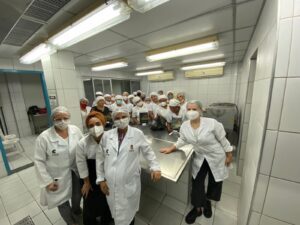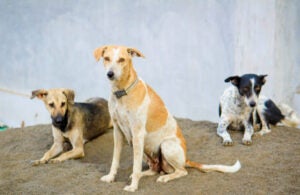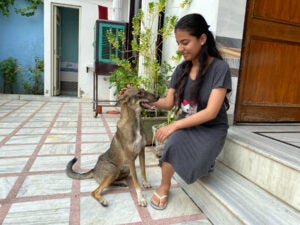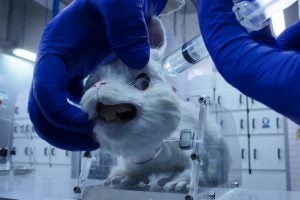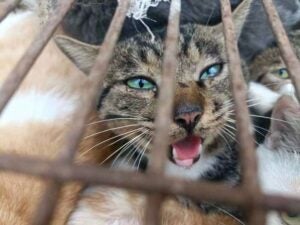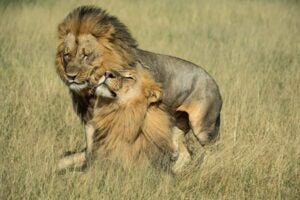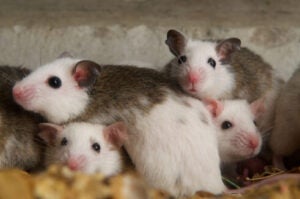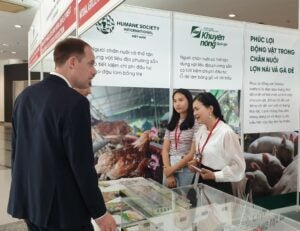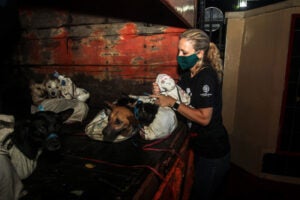
JAKARTA, Indonesia—Forty five dogs rescued from an illegal dog slaughterhouse have flown to North America to seek loving adoptive families. The dogs—including Sunshine, Oreo, Alice, Neo, Dave, Randy and Olive—were saved by police last November, with assistance from the Dog Meat Free Indonesia (DMFI) coalition which campaigns for a nationwide ban on the dog meat trade. DMFI rescuers discovered the dogs tied up in sacks on the back of a truck as it arrived at a notorious slaughterhouse that was reported to kill on average up to 30 dogs per day.
The 45 dogs—including puppies born to some of the dogs who were heavily pregnant when rescued—had been trafficked from West Java on a grueling 365-mile journey to Sukoharjo. Many of them had painful skin diseases at the time of rescue, and required treatment at DMFI’s shelter for shock, dehydration, malnutrition and deep wounds from the snares used to catch them. Once settled at Humane Society International’s care and rehabilitation centre in North America, they will be evaluated before being made available for adoption.
Bali-based Lola Webber, Humane Society International’s director of campaigns to End Dog Meat, was at the police interception to help rescue the dogs. Webber says: “Seeing the terrified and traumatized faces of these dogs huddled together at the slaughterhouse, is something that will stay with me for the rest of my life. They were skin and bones, dehydrated, weak and bewildered, suffering from profound trauma and horrific wounds from their capture. Now that they’ve recovered, flying them to North America will give them the best chance of a loving home where they will get to play with toys, sleep in soft beds and enjoy all the belly rubs they could they ever want. The dog meat trade has already been banned in 19 jurisdictions across Indonesia. I hope the government will take the next step of banning this awful trade for good so that no more dogs have to suffer this cruelty in future.”
Nationwide opinion polls from 2021 show that only a small minority of Indonesians (4.5%) consume dog meat, and 93% of all Indonesians support a ban on the dog meat trade. Despite this, conservative estimates suggest that more than one million dogs a year are stolen, trafficked, slaughtered and sold for human consumption. Many of them are pets snatched from their homes or the streets who are bludgeoned and bled to death at markets or slaughterhouses.
As well as being cruel, the dog meat trade jeopardizes Indonesia’s anti-rabies efforts and represents a substantial public health threat. Rabies is endemic across most of Indonesia, with only eight provinces holding rabies-free status. With dogs being routinely stolen from rabies positive areas and trafficked into rabies-free areas, the dog meat trade actively undermines attempts to control the deadly disease.
Karin Franken of Jakarta Animal Aid Network and national DMFI coordinator, said: “For the past ten months since their rescue, we’ve cared for these dogs at our shelter, healed their wounds and given them the love and care they needed to recover from their ordeal. The puppies born to dogs who were heavily pregnant when stolen for the meat trade, have only experienced human kindness, but the others have seen the very worst of humanity and it must have been extremely frightening. I’m thrilled that they will now be able to put all that trauma behind them and start new lives in loving, adoptive.”
Fifty-three dogs in total were rescued at the Sukoharjo interception which was conducted under COVID-19 health and safety restrictions, and a veterinarian was on site throughout. At the DMFI shelter the dogs received vaccinations against rabies, coronavirus, distemper and parvovirus. The dogs also underwent quarantine for more than 30 days, and received veterinary health checks in accordance with regulations prior to transport overseas. The remaining dogs will be open to local adoption and provided life-long care at the JAAN shelter as part of the shelter team family if needed.
Dog meat trade facts:
- Guruh Tri Susilo, the trucker driver, and Suseno, the slaughterhouse owner, were both found guilty of breaking Law 18 of 2009 chapter 89 regarding animal health and husbandry, and sentenced to 17 and 12 months in jail respectively. Suseno’s conviction marked only the country’s third conviction of a dog meat trafficker since the national government’s declaration in 2018 that “dogs are not food.”
- The dog meat trade is banned in 18 cities and regencies across Indonesia. The regencies are Karanganyar, Sukoharjo, Semarang, Blora, Brebes, Purbalingga, Mojokerto, Temanggung, Jepara and Magelang. The cities are Salatiga, Malang, Semarang, Magelang, Blitar, Mojokerto, Medan and Surabaya.
- In addition to the 18 locations in Indonesia, across Asia the trade in and slaughter, sale and consumption of dogs is also banned or otherwise ended in Taiwan, Hong Kong, the Philippines, Thailand and two major cities in mainland China. In South Korea a government-initiated task force is currently considering the issue of a ban. President Yoon Suk-yeol has stated he would not oppose a dog meat ban provided there is social consensus, and first lady Kim Keon-hee has spoken publicly of her desire for an end to dog meat consumption.
- The Dog Meat Free Indonesia campaign comprises local campaigners Jakarta Animal Aid Network and Animals Friends Jogja, and international groups Humane Society International, Four Paws and Animals Asia.
ENDS
Download photos and video of the dogs being prepared/ loaded at the shelter and at Jakarta airport
Photos and videos of the police interception and the dogs at the DMFI shelter
Media contacts:
Indonesia
- Lola Webber, Humane Society International’s End Dog Meat campaign director, and Dog Meat Free Indonesia international coordinator : Lwebber@hsi.org ; +6281337408768
- Karin Franken, Jakarta Animal Aid Network Founder, and national coordinator Dog Meat Free Indonesia Coalition : jaan_adopt@yahoo.com ; +6282122487794
United Kingdom
- Wendy Higgins, Humane Society International’s director of international media: whiggins@hsi.org

